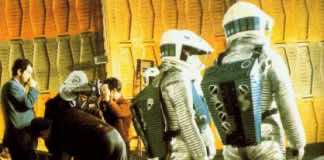 And the award for greatest downer of 2013 goes to Our Children (À perdre la raison). But the marvel of Our Children, Belgium’s entry into the foreign-language Oscar race, is not about how gloomy it is but how profoundly sympathetic a craftsman director Joachim Lafosse comes across with this work. The French-language film follows the marriage of a young Beligian woman with a young Arab man and the brood that soon follows. Murielle (Émilie Dequenne) and Mounir (Tahar Rahim) are rapturously in love on a primal level and just want to be together. Their union seems idyllic were it not for the subtle influence by the at-first mysterious Dr. André Pinget (Niels Arestrup).
And the award for greatest downer of 2013 goes to Our Children (À perdre la raison). But the marvel of Our Children, Belgium’s entry into the foreign-language Oscar race, is not about how gloomy it is but how profoundly sympathetic a craftsman director Joachim Lafosse comes across with this work. The French-language film follows the marriage of a young Beligian woman with a young Arab man and the brood that soon follows. Murielle (Émilie Dequenne) and Mounir (Tahar Rahim) are rapturously in love on a primal level and just want to be together. Their union seems idyllic were it not for the subtle influence by the at-first mysterious Dr. André Pinget (Niels Arestrup).
The couple makes him lasagna for dinner, so Mounir might introduce Murielle, but André is too busy to enjoy his favorite dish, though he seems very appreciative. The viewer can easily assume that this man is Mounir’s father, but it soon becomes apparent he is his brother-in-law, who married Mounir’s elder sister, so she might obtain her papers. Though their relationship is professional, Andres has taken a shine to Mounir and has become a father figure to him. He offers the couple a room in his home and even buys presents for Murielle.
Of course there’s something wrong here, and Lafosse knows how to turn the screws ever so subtly to ease you into a horrific outcome portended during the film’s opening.  His hand is far from heavy. We meet Murielle in a hospital bed weeping and pleading with someone at her bedside to bury her children in Morocco. The scene is soon followed by a shot on the tarmac of an airport and some luggage carriers. In the distance, four tiny white coffins ride a conveyor belt into the belly of the plane.
His hand is far from heavy. We meet Murielle in a hospital bed weeping and pleading with someone at her bedside to bury her children in Morocco. The scene is soon followed by a shot on the tarmac of an airport and some luggage carriers. In the distance, four tiny white coffins ride a conveyor belt into the belly of the plane.
From the start, the scene looms over every moment of Our Children, which then unfolds in flashback. The threat of this outcome hangs over every instance of happiness, as the children are born, one after another, from one scene to the next. Lafosse places cinematographer Jean-François Hensgens often at a distance with foreground objects often blurred out. The distance allows the film to grow gradually without histrionics and doom but a disarming naturalistic style. But it’s also a device that shows the walls closing in on these characters. André becomes more subtly oppressive while Mounir grows more passive. Meanwhile, Murielle strains to find some bliss while she gradually seems to suffocate.
Dequenne handles the burden of Murielle’s quiet, growing suffering with a delicate yet heart-wrenching touch. Dequenne, who burst on the scene as the titular protagonist of the Dardenne brothers’ Rosetta won the Un Certain Regard Award for Best Actress at Cannes last year for her portrayal.  There’s an amazing uncut scene where she’s driving a car all alone singing to a ballad by Julien Clerc crooning to loving women (“Femmes Je Vous Aime”). With every verse she grows more morose until she cannot sing anymore. It’s an amazing moment that stands as raw testament to the actress’ talent.
There’s an amazing uncut scene where she’s driving a car all alone singing to a ballad by Julien Clerc crooning to loving women (“Femmes Je Vous Aime”). With every verse she grows more morose until she cannot sing anymore. It’s an amazing moment that stands as raw testament to the actress’ talent.
Lafosse handles passive-aggression with a delicate, honest hand that might be lost on some who prefer drama to hit them over their head. But it’s the film’s subtlety that gives it its potency. The story happens to be based on a sensational true story that rocked Belgium in 2007. In more clumsy hands, it could have gone Lifetime-network/movie-of-the-week. However, Lafosse paints a delicate, heartfelt portrait that does not demonize. The sympathy he brews up with Our Children is humanistic and profound. It’s a revelatory work that shows the thin line between love and madness.
Our Children runs 111 minutes and is not rated (psychological and implied violence abounds). It opens in South Florida exclusively at the Miami Beach Cinematheque this Friday, Sept. 27, which provided a DVD preview screener for the purposes of this review.









